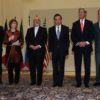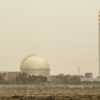From Russia Today
IDF targeted UN peacekeepers in Lebanon – Spanish military report

Corporal Francisco Javier Soria Toledo, a Spanish soldier serving as a member of United Nations Interim Force in Lebanon UNIFIL was killed in the exchange of hostilities between Lebanese militant group Hezbollah and the Israel Defense Forces (IDF) along the Israeli-Lebanese border on January 28. IDF shelled the area after Hezbollah attack that killed two Israeli soldiers.
“Every time, they [Israelis] corrected the trajectory from Majidiye [location] to the 4-28” post, where the UNIFIL peacekeepers were stationed,” Corporal Ivan Lopez Sanchez, who was stationed nearby, told Spanish investigators, according to El Pais newspaper which saw the report.
The paper published the testimony of another Spanish soldier, Sergeant Julio Xavier Garcia, who said that shells initially fell about 500 meters north of the UN post and then they “corrected the trajectory towards the position.” Garcia added that he took cover along the watchtower “to clearly see it was a fixed shot” and that “falling projectiles were getting closer.”
Click here for the full story
From the Jewish Daily Forward
If Nuclear Iran Is So Scary, What About Israel?
By Michael Karpin

Getty Images / Lior Zaltzman illustration
As the web indulges in polemics on Iran’s Preliminary Nuclear Deal, I’m seeing a lot of tweets and statuses asking why Israel succeeded in developing its nuclear capabilities without making the rest of the world nervous enough to prompt a forced inspection of its nuclear installations or threaten it with sanctions — while Iran (and Iraq, and Libya) failed to do so.
This question was also asked among many readers of my recent Forward article, “Revealing Israel’s Nuclear Secrets,” which cited the top-secret report that was declassified by the Pentagon in February, exposing for the first time the actual depth of the military cooperation between the United States and Israel. The report contains details about the development of Israel’s nuclear infrastructure and states that in the eighties, Israeli scientists were reaching the capabilities to employ hydrogen fusion.
So, why did Israel succeed while Iran failed?
The main difference between the two is that Iran’s nuclear program makes headline news, while Israel’s nuclear capability remains hidden in the shadows. The Israeli bomb lies in “the Basement.” It’s intended to be a weapon of last resort, the silent guarantor of the country’s existence in the face of hostile neighbors. Iran does not need a weapon of last resort because it is not currently intimidated or threatened by any of its neighbors. This is the basic distinction between the two.
From the Jewish Daily Forward
4 Questions on Iran for Benjamin Netanyahu
By J.J. Goldberg
Benjamin Netanyahu’s round-robin tour of America’s Sunday interview shows — hitting NBC, ABC and CNN on a single morning — was a master stroke by Israel’s much-maligned public diplomacy operation. If any news consumer was still wondering on Saturday night where Israel’s elected government stands on the Iran nuclear framework agreement, that was cleared up by Sunday afternoon.
Left unanswered are several questions about the prime minister’s own intentions. In fact, his performance raises as many questions as it answers. Logically, he should be reacting to the announcement of the Lausanne framework with a victory lap around the capitals of the six powers, claiming credit for raising the global alarm (not entirely deserved — it was already on the world agenda before he became prime minister, but he certainly played a key role) and for providing the military threat that helped push the Iranians to blink.
Thanks in good measure to his efforts, Iran has agreed to decommission two-thirds of its operating centrifuges, stop development of its next-generation centrifuges, get rid of all its medium-enriched 20% uranium and all but 300 kilograms of its low-enriched 3.5% uranium, convert its menacing nuclear installations at Fordow and Arak to alternate uses and allow highly intrusive inspection of all the above. There are major details still be worked out in the coming months, including how the inspections will work, where the excess uranium will go and what happens if they’re found cheating. But it’s still an impressive list of concessions, way beyond anything they’ve ever agreed to in the past and far more than anyone was expecting in the negotiations’ frantic closing days.
Click here for the full story
From The Independent
From the Jewish Telegraphic Agency
Israel details requirements for final nuclear deal with Iran
JERUSALEM (JTA) — Israel has created a list of modifications it says are needed in a final deal with Iran over its nuclear program.
The list was presented Monday by Yuval Steinitz, Israel’s minister of intelligence and strategic affairs, to reporters at a hotel in Jerusalem, The New York Times reported.
Steinitz said the modifications to the agreement, which is scheduled to be finalized by the end of June, will make it more acceptable to Israel.
Click here for the full story
From PressTV
Palestinians seek UN timetable to end Israeli occupation

The Palestinian ambassador to the UN has voiced the Palestinians’ willingness to see the adoption of a UN Security Council resolution for ending the Israeli regime’s occupation and establishing a Palestinian state.
Riyad Mansour on Monday expressed hope to see the 15-member council’s “political will” over the adoption and implementation of a resolution.
He added that the adoption of a resolution with a timetable for Israel’s withdrawal from Palestinian territories would be “one of the most effective measures to combat extremism in our region because extremists receive their fuel from the injustice of the Palestinian people.”
He pointed out that if “a just solution to this conflict” is passed “in a short period of time, then you’ll take away from them the main source of recruitment and mobilization.”

The UN resolution would also help resolve perhaps 70 percent of the “burning issues in the Middle East,” Mansour said.
In 2014, the council dismissed a Palestinian resolution that set a three-year timetable for the termination of the Israeli occupation.
The comments come as Israeli Prime Minister Benjamin Netanyahu said before the March election that he would not allow the establishment of a Palestinian state.
In 1967, Israel occupied the West Bank, East al-Quds (Jerusalem) and the Gaza Strip, but withdrew from the enclave and laid siege to it in 2005.
Click here for the full story
From Ynet News
Israel seizes electronics bound for Gaza militants
Inspectors foil attempt to smuggle banned equipment, including special cameras and communications devices, through checkpoint Israeli inspectors at a crossing point into the Gaza Strip stopped an attempt to smuggle in hi-tech electronics destined for Palestinian militants, the government said Monday.
Security staff at the Kerem Shalom goods crossing into southern Gaza found the equipment, banned from Gaza under Israeli restrictions, concealed on an Israeli truck with a permit to take in consumer electronics.
Click here for the full story
From the Jewish Daily Forward
Barack Obama Pours Cold Water on ‘Recognize Israel’ Push for Iran Nuclear Deal
President Calls Bibi Demand ‘Akin’ to Rejecting Agreement
By Reuters
“The notion that we would condition Iran not getting nuclear weapons in a verifiable deal on Iran recognizing Israel is really akin to saying that we won’t sign a deal unless the nature of the Iranian regime completely transforms,” Obama said in an interview with National Public Radio (NPR).
“That is, I think, a fundamental misjudgment… We want Iran not to have nuclear weapons precisely because we can’t bank on the nature of the regime changing,” he said.
Click here for the full story
From The Independent
From The Independent
From the Jewish Telegraphic Agency
Supreme Court rejects Alan Gross’ appeal in suit vs. U.S.
(JTA) — The U.S. Supreme Court rejected Alan Gross’ appeal in a $60 million lawsuit he filed against the U.S. government.
On Monday, the high court rejected the appeal of the Jewish-American contractor, who spent five years in a Cuban prison, Reuters reported.
Gross and his wife sued the U.S. government for negligence in 2012, saying it had sent him to Cuba without adequate supports.
Last year, the U.S. Court of Appeals for the District of Columbia ruled that the U.S. government was immune from claims arising in a foreign country. A district court originally rejected the suit.
Click here for the full story
From PressTV
Hamas security forces arrest Salafist sheikh for ISIL ties: Report

Security forces with the Palestinian resistance movement Hamas have reportedly arrested a radical Salafist sheikh on charges of membership in the ISIL Takfiri terrorist group.
A security source reported the arrest on Monday, saying, “Adnan Khader Mayat from the Bureij refugee camp (in central Gaza) was arrested as part of an investigation,” AFP reported.
Hamas forces have in the past cracked down hard on Salafist groups in the Gaza Strip, the report added.
In a statement, sources close to the Salafists who are currently being held behind bars accused the Palestinian movement of “continuing its raids among our brothers and sons.”
Born in the 1980s, the Salafists are essentially an extension of Wahhabism, itself an artificial religious creation. Salafists claim religious supremacy over those they have labeled as “infidels.” They have often been slammed by the Sunni Islam, branded a sect rather than a religious school of thought or even a movement.
Click here for the full story
From Russia Today
Ukrainian president says he’s open to referendum on regional powers

The Ukrainian president said he doesn’t object to a referendum on the decentralization of Ukraine, which could give greater powers to the Donbass region. However, the rebels in eastern Ukraine have denounced Petro Poroshenko’s promises as ‘meaningless.’
On Monday, Poroshenko said his government’s previously unfavorable stance on autonomy for the Donetsk and Lugansk regions has shifted.
“I’m ready to launch a referendum on the issue of state governance if you decide it is necessary,” he told the parliamentary commission, which is working on relevant amendments to the Ukrainian constitution.
From Russia Today
‘Reclaim Australia’: Anti-Islam rallies provoke fear in Muslim community

Muslim community leaders expressed fear and bewilderment after protesters gathered in over a dozen Australian cities at the weekend to express their opposition to minority groups, who want to ‘change the cultural identity of the country.’
Randa Kattan, CEO of Arab Council Australia, warned such racist type of events could quickly spiral out of control.
“In terms of numbers they might be insignificant, but in terms of damage, it is significant,” she told the Guardian.
She called the protesters “squeaky wheels grabbing attention,” but was careful not to underestimate such groups for attracting interest to their cause.
“It only takes one incident,” she warned.
Reclaim Australia protests demand banning of Islam and the Burqa #ReclaimAustralia Britain stands with Australia pic.twitter.com/MrJOeRVmXi
— David Jones (@DavidJo52951945) April 4, 2015
The ‘Reclaim Australia’ protests on Saturday were held in 16 cities and towns nationwide, attracting hundreds of demonstrators, who said they are against the imposition of Sharia law, and the wave of multiculturalism that has swept the country.
However, the anti-Islam protesters met stiff opposition from the left-wing umbrella group ‘No Room for Racism.’ Tensions peaked in central Melbourne, where police struggled to keep anti-Islam and anti-racism protesters separated. Medical officials said four people were treated for minor injuries, while police spokeswoman Belinda Betty said two men and a woman were arrested following the violence.
More than 100 police were deployed, with almost a dozen mounted police also helping to keep the situation under control.
Click here for the full story
From the Jewish Daily Forward
Marry a Jew and You’re One of Us
Counter Intermarriage by Welcoming Newcomers to Faith
By Steven M. Cohen and Joy Levitt
Centuries later, at a time when the number of American Jews marrying non-Jews has reached an all-time high — 80 percent of Reform-raised Jews who married in 2000-2013 married non-Jews — thousands are again choosing to join the Jewish people, but nowhere near as many as we would like.
Unbeknownst to even keen observers of Jewish life, about half of those who identify as Jews but were not born Jewish never underwent formal rabbinic conversion. The 2013 Pew survey of American Jews found 79,000 adult Jewish converts, but another 83,000 who identify as Jews even though they reported no Jewish parents and had not undergone conversion.
Click here for the full story









